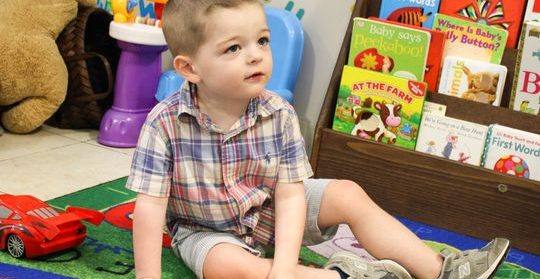The Scott Center for Autism Treatment at the Florida Institute of Technology will begin training police officers how to better respond to calls involving autistic people. Video by Caroline Glenn/Central Florida Future.
Growing up with autism, Reece Scott faced plenty of struggles.
“Chief among them was not really knowing what people were thinking or what people were really trying to communicate,” recalled Scott, now 27 and living on his own in Japan.
Even crystal-clear phrases like “Put your hands where I can see them” might go in one ear and out the other. With so many autistic children being non-verbal, they may not even be able to understand what a police officer is saying.
“Disaster could follow,” said Michael Kelley, director of the Scott Center for Autism Treatment at the Florida Institute of Technology, founded by Scott’’s parents, Edward and Cheryl, in 2009.
Kelley’s fears were realized July 18, when a North Miami officer shot behavioral therapist Charles Kinsey, hitting him in the leg, as he tried to calm an autistic patient who had wandered away from his group home. The head of the police union said later that the officer had accidentally shot Kinsey, and was in fact aiming for the patient, Arnoldo Rios.
“It appeared to the officers that the white male was trying to do harm to Mr. Kinsey,” John Rivera, president of the Dade County Police Benevolent Association, said at a press conference Thursday. The patient was holding a toy truck and no gun was found.
Educating officers and giving them the tools they need to avoid potentially fatal misunderstandings is the Scott Center’s newest focus, and has been the No. 1 request from local emergency personnel. Partnered with the Rockledge Police Department, the Scott Center’s autism experts have come up with a “unique, brand new curriculum” to train officers how to recognize symptoms of the condition that affects 1 in 68 children, said Kelley.
“It’s not just families that come in contact with children with autism, but it’s professionals,” said Kelley. “Parents have to bring their children to get their hair cut, they have emergencies. So they come in contact with doctors, dentists, with police officers and with fire fighters and with every other kind of professional that you can think of.”
For Melbourne parents Kate and Ryan McGill, safety is a concern for their little boy Henry, who is almost 3 and has autism.
“Not everyone’s going to be the same,” said Kate, making it tough for police to handle each case correctly.
That’s why it’s important for agencies to have ongoing training, said Lisa Goring, executive vice president of programs and services at Autism Speaks, an advocacy organization that, to date, has provided training to more than 18,000 first responders.
Modeled after its approach to autism treatment — which provides in-person and digital services — the Scott Center training will go far beyond the couple hundred officers expected at the first session on Aug. 24. The Center is also planning training videos that will be made available to agencies across the globe.
Brevard County Sheriff Wayne Ivey said his officers will certainly take part in the Scott Center programs and have already gone through Crisis Intervention Team Training, which teaches officers how to react to situations involving those with mental illnesses.
“The last thing we want to do is perhaps affect the arrest of somebody that doesn’t need to be arrested,” said Ivey. “ … What might diffuse that situation? What are things that might explode that situation?”
Edward Scott recalled how something as innocent as singing would upset his son. For others like Rios, who is sensitive to noise and touch, loud commands from a police officer might strike the wrong nerve.
In a cellphone video that captured the Miami shooting, an officer can be heard yelling “Let me see your hands. Get on the ground. Get on the ground,” at Rios, who continued playing with his toy truck unfazed.
At a Saturday news conference, Rios’ sister said her brother hasn’t been sleeping or eating since the incident, where he was thrown to the ground after Kinsey was shot.
Because every case is different, said Goring, police should make the effort to get to know people in their community with autism, and vice versa. Vince Pryce of the Melbourne Police Department also recommended more patients carry autism alert cards, which detail a person’s diagnosis and provide emergency contacts.
Even as a parent, Kate McGill vividly remembers the frustration of trying to communicate with her son, who’s been going to the Scott Center for a little over a year.
“Is he hungry? Is he tired? What’s the problem?” she and her husband would ask themselves over and over. Sometimes, they wondered if Henry could hear them at all.
This past year, said Kate, has been groundbreaking for Henry, who’s quick with the “please” and “thank you” now.
“They’ve unlocked something that we were not able to,” she said.
Since 2009, the Scott Center has provided treatment to young children like Henry, after Ed Scott saw the change early intervention therapy made in his son’s life.
“If you were to meet Reece, you would have no idea that he had those challenges as a child,” he said of his son, who graduated from Holy Trinity Academy in Melbourne and went on to study at Georgetown and Oxford.

